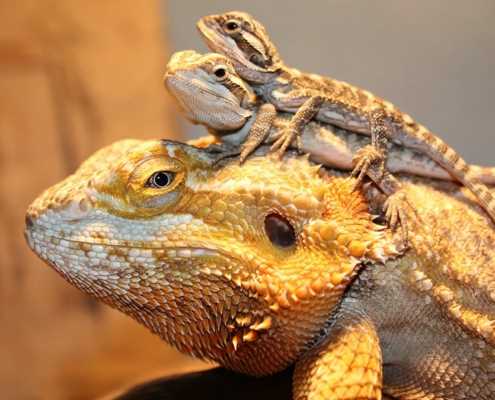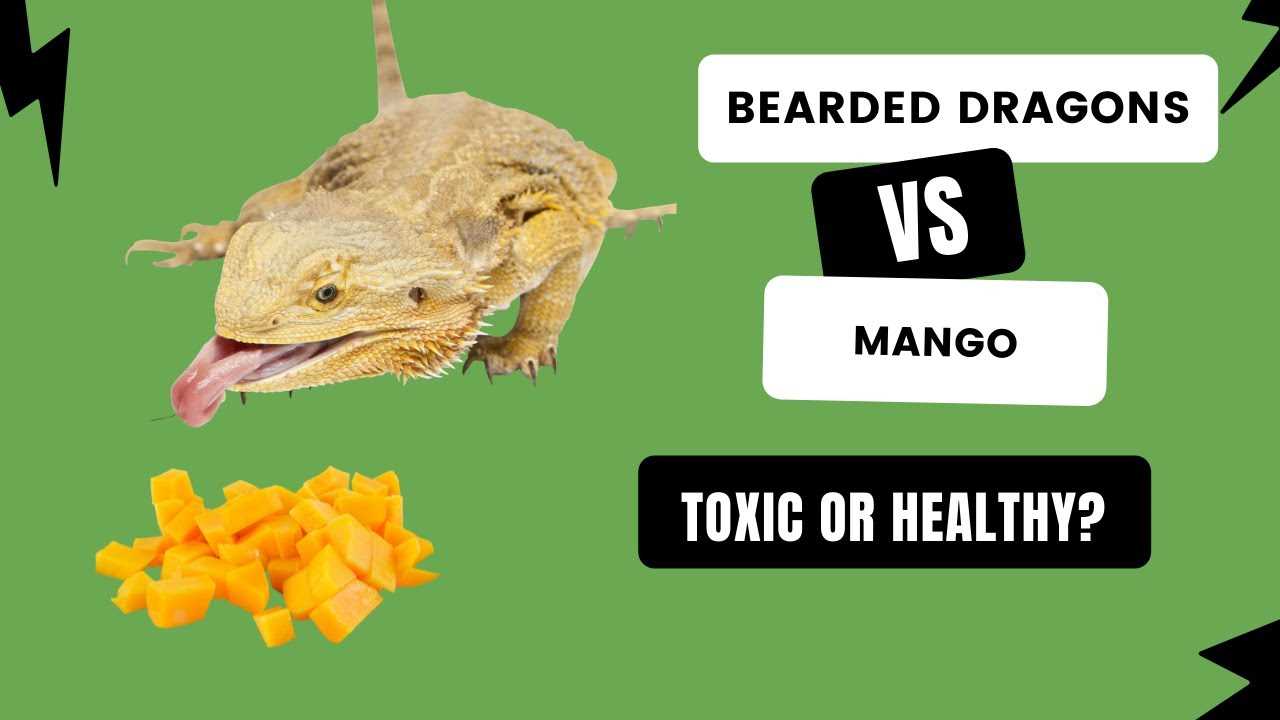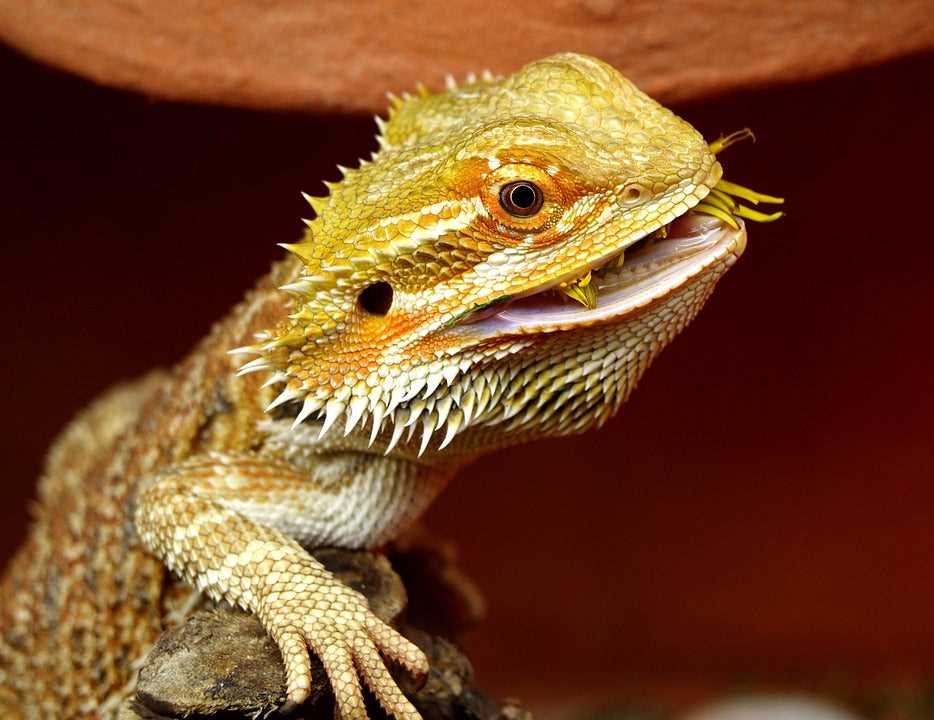Bearded dragons are omnivorous reptiles that enjoy a variety of fruits and vegetables as part of their diet. While they primarily eat insects and leafy greens, many owners wonder if it is safe to feed their bearded dragon mango.
While mango can be a healthy treat for your bearded dragon, it should not make up the majority of their diet. Remember to balance their meals with other fruits, vegetables, insects, and leafy greens to ensure they receive all the necessary nutrients for a healthy and happy life.
Can Bearded Dragons Eat Mango?
Mango is a delicious tropical fruit that many people enjoy, but can bearded dragons eat mango too? The answer is yes, bearded dragons can eat mango, but it should be given to them in moderation as an occasional treat.
Nutritional Benefits of Mango
Mangoes are packed with nutrients that can be beneficial for bearded dragons. They are a good source of vitamin C, vitamin A, and vitamin E, which are all important for the overall health of your dragon.
Vitamin C is an antioxidant that helps boost the immune system and fight off infections. Vitamin A is essential for good vision and a healthy respiratory system. Vitamin E is important for skin health and can help prevent dryness and irritation.
In addition to vitamins, mangoes also contain fiber, which can aid in digestion and help prevent constipation in bearded dragons.
Risks and Considerations
While mangoes can be a healthy addition to your bearded dragon’s diet, there are some risks and considerations to be aware of. Mangoes are high in sugar, so they should only be given as a treat and not as a staple food.
How to Feed Mango to Your Bearded Dragon
| 1. | Choose a ripe mango that is soft to the touch. |
| 2. | Wash the mango thoroughly to remove any dirt or residue. |
| 3. | Peel the skin off the mango using a knife or your hands. |
| 4. | Remove the pit from the mango using a knife. |
| 5. | Cut the mango into small, bite-sized pieces. |
| 6. | Offer the mango to your bearded dragon, placing the pieces in their food dish or holding them with tongs for them to eat. |
| 7. | Monitor your dragon while they eat the mango to ensure they are chewing and swallowing it properly. |
Remember to always feed mango to your bearded dragon in moderation and as part of a balanced diet. It should not make up more than 10% of their overall food intake.
Consult with a reptile veterinarian if you have any concerns or questions about feeding mango or any other fruits to your bearded dragon.
Nutritional Benefits of Mango
Mango is a delicious tropical fruit that can provide various nutritional benefits for bearded dragons. Here are some reasons why they can eat mango:
Vitamins and Minerals

Mango is rich in vitamins and minerals that are important for the overall health of bearded dragons. It contains vitamin A, which is crucial for maintaining good eyesight and a healthy immune system. Mango also provides vitamins C and E, which are powerful antioxidants that can help protect the dragon’s body from damage caused by free radicals. Additionally, mango is a good source of potassium and magnesium, which are essential minerals for proper muscle function and nerve transmission.
Hydration
Fiber

Mango contains dietary fiber, which is essential for good digestion in bearded dragons. Fiber can help regulate bowel movements and prevent constipation, which can be a common issue for these reptiles. Including mango in their diet can contribute to a healthy digestive system and prevent gastrointestinal problems.
Antioxidants
Mango is packed with antioxidants like beta-carotene, lutein, and zeaxanthin. These antioxidants can help protect the bearded dragon’s cells from oxidative stress and reduce the risk of certain diseases. They also have anti-inflammatory properties that can support the dragon’s overall well-being.
Overall, mango can be a nutritious and tasty addition to a bearded dragon’s diet. However, it should be offered in moderation and as part of a balanced diet that includes a variety of other fruits, vegetables, and protein sources. Always consult with a reptile veterinarian before introducing any new foods to your bearded dragon’s diet.
Risks and Considerations
One of the main concerns with feeding mango to bearded dragons is its high sugar content. Mangoes are naturally sweet and contain a significant amount of natural sugars, which can lead to weight gain and other health issues if consumed in excess. Too much sugar can also disrupt the bearded dragon’s gut flora, leading to digestive problems and diarrhea.
Another important consideration is the size and age of your bearded dragon. Younger dragons may have a harder time digesting fruits like mango due to their underdeveloped digestive systems. It is recommended to introduce mango gradually and in smaller pieces to avoid overwhelming their digestive system.
Furthermore, always make sure to remove any seeds, skin, or pits before feeding mango to your bearded dragon. These parts can pose a choking hazard or cause digestive blockages. It is also crucial to wash the mango thoroughly to remove any pesticides or chemicals that may be present on the skin.
In summary,
bearded dragons can eat mango as an occasional treat, but it should be given in moderation and as part of a balanced diet. The high sugar content and the potential digestive issues make it important to exercise caution when feeding mango to your reptile friend. Remember to remove any seeds or skin, and wash the mango thoroughly before serving. By following these guidelines, you can safely incorporate mango into your bearded dragon’s diet and provide them with a tasty and nutritious snack.
How to Feed Mango to Your Bearded Dragon
1. Choose ripe and organic mango:
When selecting mango for your bearded dragon, make sure to choose ripe and organic fruits. Ripe mangoes are sweeter and softer, making them easier for your pet to consume. Organic mangoes are free from harmful pesticides, which can be harmful to your bearded dragon’s health.
2. Prepare the mango:
Start by washing the mango thoroughly to remove any dirt or residue. Next, peel the mango and remove the pit. Be sure to remove all traces of the pit, as it can pose a choking hazard to your bearded dragon.
3. Cut the mango into bite-sized pieces:
After peeling and removing the pit, cut the mango into small, bite-sized pieces. This will make it easier for your bearded dragon to eat and digest the fruit.
4. Offer mango as a occasional treat:
While mango can be a healthy addition to your bearded dragon’s diet, it should only be offered as an occasional treat. Mango is high in sugar, and excessive consumption can lead to weight gain and other health issues. Limit the amount of mango you feed to your pet to avoid these problems.
5. Observe your bearded dragon:

After introducing mango to your bearded dragon’s diet, closely observe their response. Some bearded dragons may have specific dietary needs or preferences, and mango may not agree with every dragon. If you notice any negative reactions, such as digestive issues or changes in behavior, discontinue feeding mango to your pet.
| Benefits of Feeding Mango to Bearded Dragons | Risks and Considerations |
|---|---|
| – Provides a good source of vitamins and minerals. | – High sugar content can lead to weight gain. |
| – Offers hydration due to its high water content. | – Allergic reactions can occur in some bearded dragons. |
| – Adds variety to your bearded dragon’s diet. | – Overfeeding mango can lead to digestive issues. |
Overall, mango can be a nutritious and tasty addition to your bearded dragon’s diet. Just make sure to feed it in moderation and monitor your pet’s response. With proper care and caution, feeding mango to your bearded dragon can be a positive experience.

I’m Lena Adams—a product of an unconventional upbringing in the African wilderness. My father, a daring explorer of African wildlife, sparked my fascination with reptiles, a passion that intertwined with the tragic loss of my mother during an expedition, leaving an indelible mark on my life. Driven to understand the creatures that captivated my parents, I embarked on my journey, sharing insights about reptiles, frogs, and lizards on my website. Through my explorations and conservation efforts, I honour my family’s legacy while seeking connections—to the creatures, nature, and the mother whose presence I yearn to understand.
